NAIROBI, Kenya ŌĆō In 2008, when Mohamed Ali Mohamed was a kid growing up in Mogadishu, Somalia, his cousin was shot by the Somali terrorist group al-Shabaab. ŌĆ£That made us run away,ŌĆØ he said.┬Ā
June 23, 2024:
NAIROBI, Kenya ŌĆō In 2008, when Mohamed Ali Mohamed was a kid growing up in Mogadishu, Somalia, his cousin was shot by the Somali terrorist group al-Shabaab. ŌĆ£That made us run away,ŌĆØ he said.┬Ā
He and his grandmother walked to the border with Kenya and settled in Nairobi. As a teenager, Mohamed would wake up at 5 am to deliver bread to nearby shops before school, but it barely earned him enough to feed himself and his younger brother, who followed later.┬Ā
Then last year, the evidence-based nonprofit GiveDirectly gave him nearly $1,000 cash, no strings attached. He used the money to start a business selling filtered drinking water to local shops, and even hired two employees to deliver it. Now 22, he earns several times as much as he used to selling bread. The extra┬Āincome goes to buy food and pay his younger brotherŌĆÖs school fees.┬Ā
ŌĆ£I thank God, because my brother is now getting an education,ŌĆØ Mohamed told me when I met him in Nairobi in April.
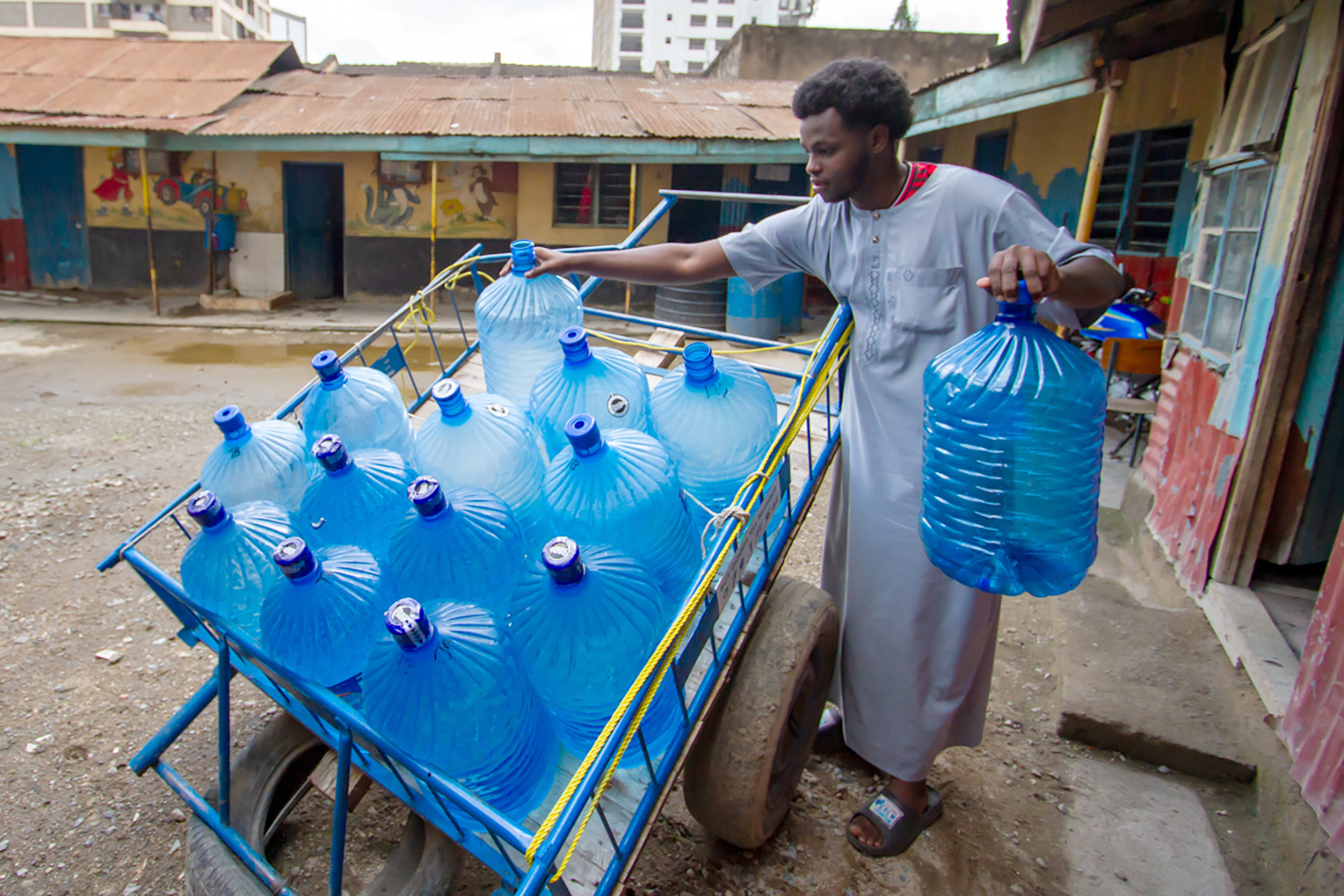
In rural African villages and refugee camps, cash assistance has long been improving the lives of people displaced by climate disasters, conflicts, and more. But today, the majority of the worldŌĆÖs refugees live in cities. And unlike the refugees who live in humanitarian camps and receive food rations, and sometimes shelter and medical attention as well, urban refugees rarely receive assistance of any kind.
A study┬Ālast year by GiveDirectly in Kenya suggests a promising new way to help them. If its results can be replicated, cash transfers could help roughly half of the worldŌĆÖs estimated 130 million displaced people, the majority of whom live in urban centers across the developing world.
Nearly 1,200 people in Nairobi were given $925 each to spend however they wished, most of them opening their first Kenyan bank account at the same time. The vast majority used the money to start or grow┬Āsmall businesses, from salons and barber shops to pharmacies and chicken coops. Recipients nearly doubled their average monthly income to 18,600 shillings ŌĆö about $143 US ŌĆö per month.┬Ā
Six months later, 88 percent of recipients reported earning more money than before. And a similar study in a semi-urban settlement in Uganda found that the number of refugee cash recipients there who were able to pay rent and feed their families had tripled, and more people could afford the health care they needed. Many spent their newfound income on childrenŌĆÖs school fees, like Mohamed did, or to grow existing businesses.
Solutions like this are urgent in a world that is now home to more displaced people than ever before. From Sudan to Syria and from Congo to Gaza and Ukraine, wars are forcing millions of people to flee their homes. Many flee first to refugee camps, but the majority will eventually settle in cities. With global conflict showing no signs of abating, the world must figure out a way to help urban refugees survive in their new homes.┬Ā
As the UN continues to reduce already meager food rations in camps in Africa and Asia, many people feel they have little choice but to migrate to cities to find work. Refugees in Kenya need special permission to leave the camps ŌĆö permission that local authorities do not easily grant, according to the World Bank. Nonetheless, in Kenya, the percentage of refugees who live in cities climbed by 9 percent from 2022 to 2023 alone to 91,600 people, according to the UNŌĆÖs refugee agency. Unable to find work due to their refugee status, language barriers, immobility,┬Ālack of community connections, or all of the above, urban refugees tend to be┬Āthe poorest┬Āof the countryŌĆÖs poor.
Jeanne Nakazungu, a mother of four, fled Congo in 2016 when a Mai-Mai militia attacked her husbandŌĆÖs village, killing his relatives and burning it down.┬Ā
ŌĆ£I hear my husband is alive. But IŌĆÖm not sure,ŌĆØ she said one morning in her room behind a stall in NairobiŌĆÖs Kasarani neighborhood where she sells bananas, tomatoes, and baby eggplants. She also cooks a pot of red beans that neighbors buy for lunch. (Her daughter Denise, 14, translates from her and her motherŌĆÖs native language of Kinyamulenge.)
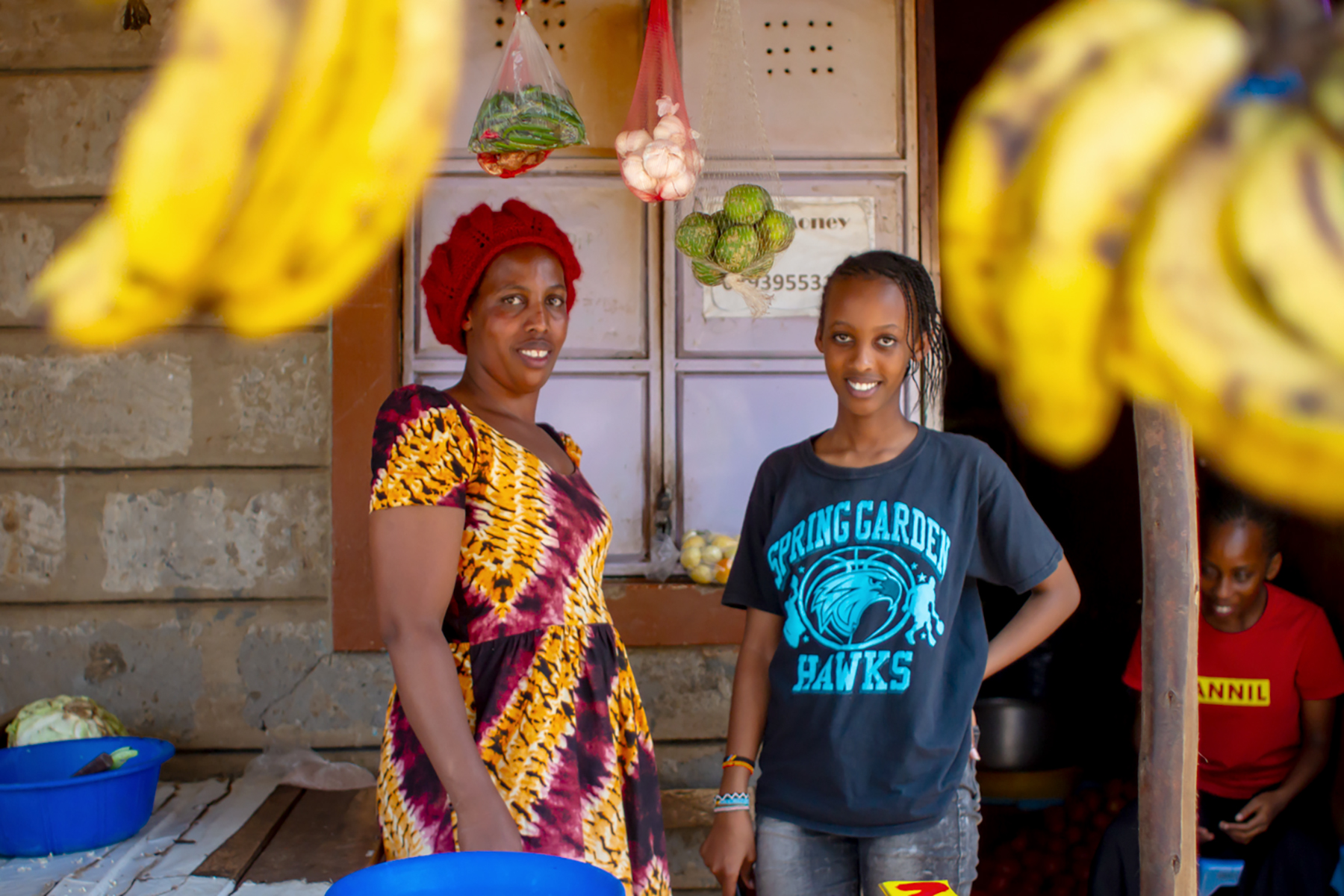
When Nakazungu first heard that a charity would give her more money than sheŌĆÖd ever imagined, ŌĆ£I didnŌĆÖt think it was true. I was so happy ŌĆö I ran and told my kids. I paid school fees, rent, (bought supplies) for my business.ŌĆØ┬Ā She hopes her family will someday have enough money to resettle in the US.┬Ā
ŌĆ£In rural areas, you use the money from GiveDirectly for the long term. You build a house; you buy a cow,ŌĆØ said Stephen Kalungu, who oversees GiveDirectlyŌĆÖs Nairobi program. ŌĆ£But when you come to the urban areas, thereŌĆÖs a quick pace. You give someone money today and tomorrow they report to you that they were already able to buy inventory or make a sale.ŌĆØ
But for Nakazungu, life as an urban refugee is expensive because it comes with an added cost beyond what her Kenyan neighbors must pay: bribes. Nearly every week, city employees walk up and down the street checking to make sure all the shops are licensed. As a refugee, she says she has been unable to obtain one. ŌĆ£Kenyans nearby, they have licenses,ŌĆØ she explained, so ŌĆ£they donŌĆÖt have to pay.ŌĆØ
Mohamed, who wears a white Islamic Thobe robe and walks with a limp, too says refugees like him have it even harder than Kenyan city dwellers do.┬Ā
Until the 2021 Refugee Act is implemented, refugees in Kenya arenŌĆÖt allowed to obtain SIM cards, which small businesses rely on to communicate with customers and make and receive payments using mobile money, which Kenyans have been using since 2007, long before Venmo and Apple Pay. The result is yet another expense: To get a SIM card, said Mohamed, ŌĆ£you have to pay a bribe.ŌĆØ
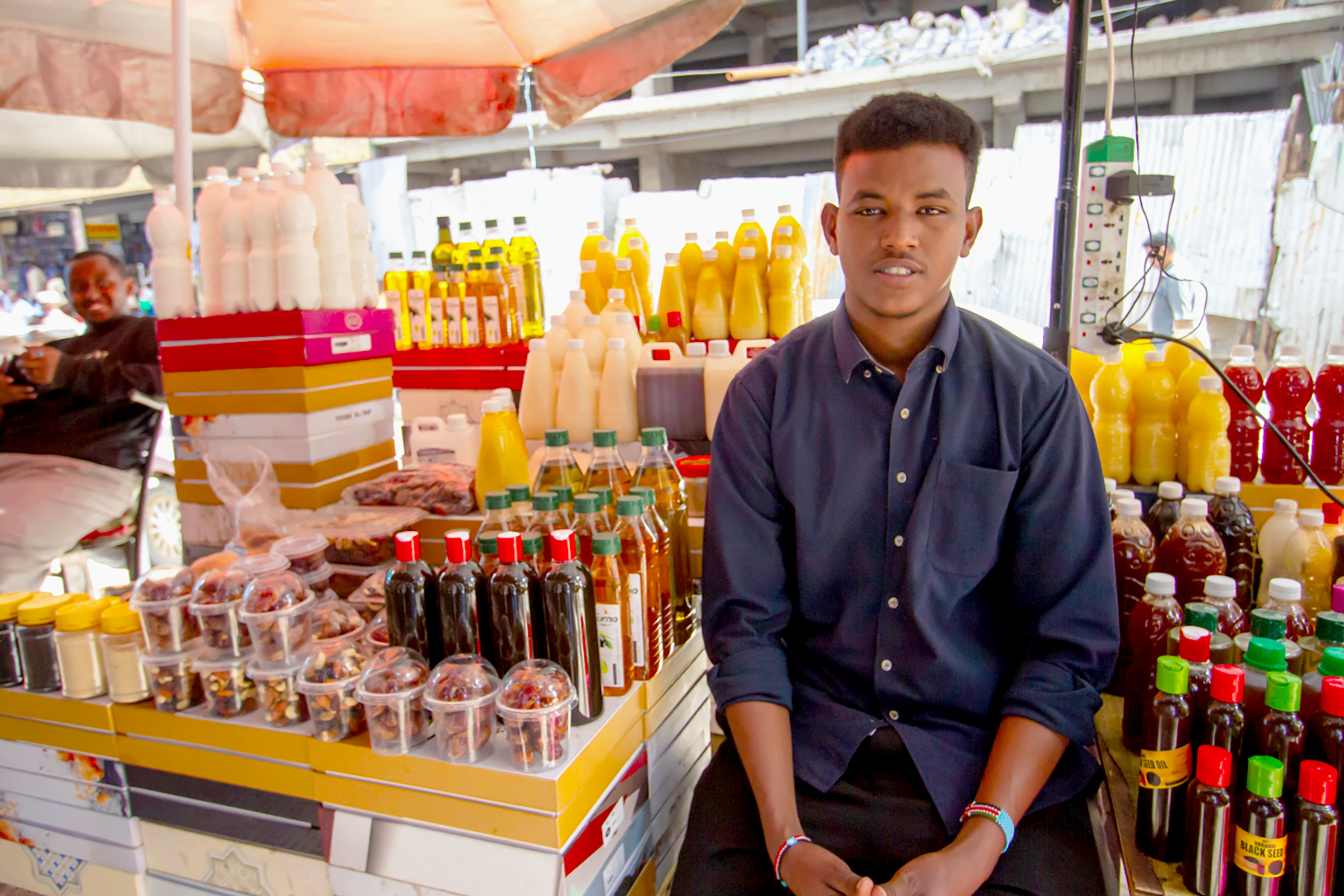
The rules for refugees in Kenya differ markedly from those in neighboring Uganda to the west, where GiveDirectly recently conducted a large study to help refugees living in semi-rural settlements.┬Ā┬Ā
There, refugees are ŌĆ£free to live wherever they want to live (which) makes it quite easy to do programs,ŌĆØ said Miriam Laker, GiveDirectlyŌĆÖs director of research. ŌĆ£In Uganda, the refugee law is very lenient, very welcoming. But in Kenya, thereŌĆÖs still restrictions.ŌĆØ┬Ā
ŌĆ£For a refugee to get a job in mainstream employment is virtually impossible, because the law doesnŌĆÖt allow it,ŌĆØ Laker says.┬Ā
This underscores one of the primary dilemmas facing the worldŌĆÖs urban refugees.┬Ā
ŌĆ£Cash transfers have large potential to help those in urban areas, particularly refugees, with basic necessities: food shelter, transport, [because] cities have very well-functioning markets,ŌĆØ said Rema Hanna, who teaches international development at Harvard Kennedy School and researches ways to improve public services to the poorest of the poor for the Abdul Latif Jameel Poverty Action Lab (J-PAL).┬Ā
But uncertain legal status and discrimination can be big challenges for refugees, Hanna said.┬ĀFor example, people may not want to rent housing to refugees, forcing them to find worse or more expensive housing. Refugees may receive lower wages because they have few opportunities and therefore little leverage.
ŌĆ£Cash transfers won’t necessarily solve these long-run issues,ŌĆØ Hanna said.┬Ā
Another concern about giving cash to refugees is the political ramifications at home.┬ĀSome Kenyans associate refugees with terrorism, due to occasional attacks in the country by the Somali terror group al-Shabaab. And local people living in poverty can come to resent refugees, Laker said, whom they see as receiving special treatment from international aid groups.
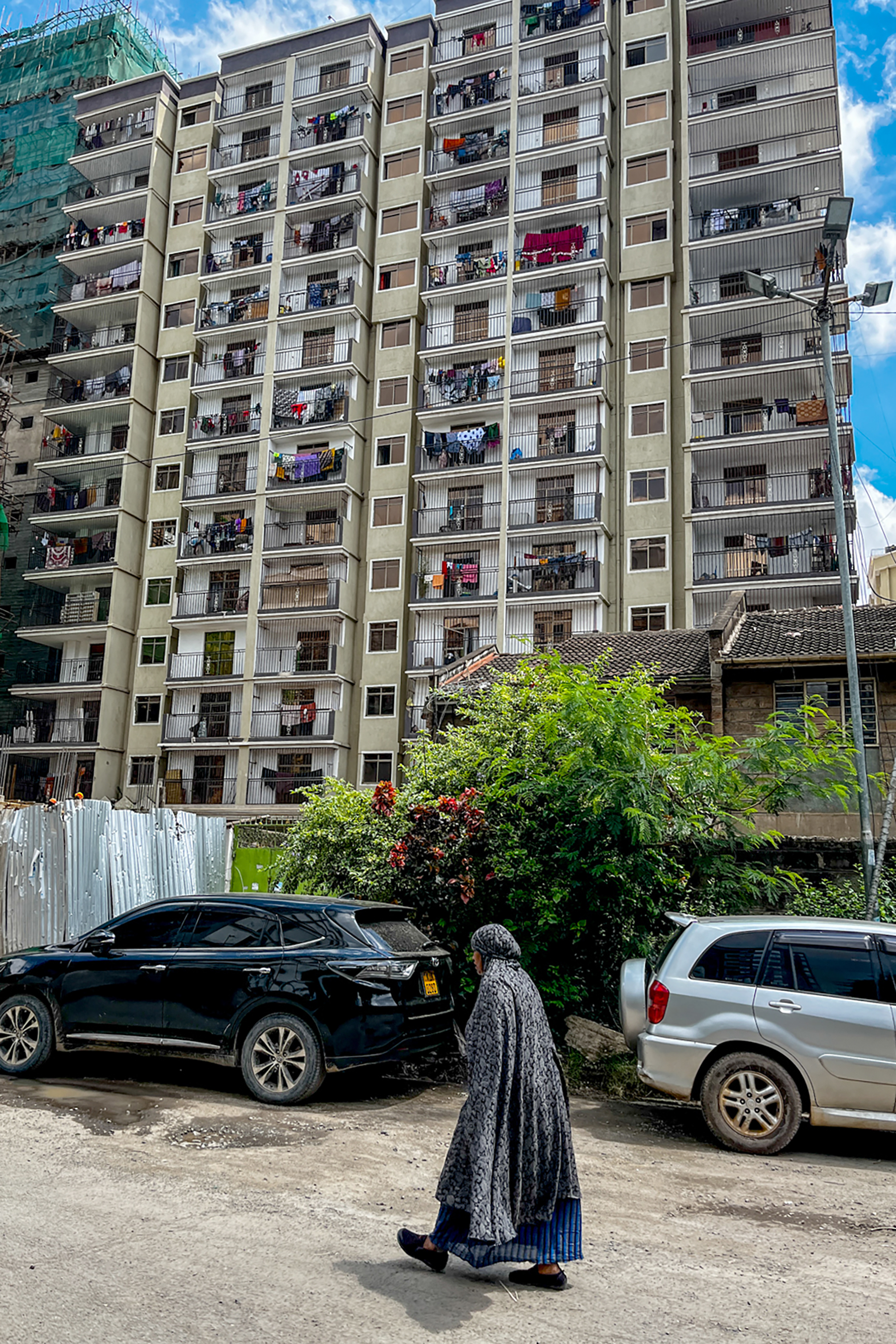
Xenophobic Kenyan politicians fan the flames, calling for crackdowns on refugees or threatening to shut down KenyaŌĆÖs refugee camps and send the refugees home. ŌĆ£The laws and the politicians make it very hard for them to give them confidence that their businesses are going to last,ŌĆØ said Laker, which discourages investment. ŌĆ£If they are sent away, they would lose everything.ŌĆØ
GiveDirectly is taking steps to ameliorate this thorny political problem: Thirty percent of recipients in its next round of cash transfers in Nairobi will be Kenyans, the other 70 percent will be refugees. This will also allow researchers to search for insights into how refugees spend the funds differently than locals do.┬Ā
ŌĆ£Having government programs just for refugees may spark resentment,ŌĆØ Hanna said. ŌĆ£Citizens often have concerns about providing transfers to refugees rather than citizens, who may also be in need. Understanding the politics and how to make the programs have wider-spread support will be key for their scale-up.ŌĆØ
Discrimination and abuse by law enforcement also haunts refugees. Uwizeye Innocent, 54, fled Rwanda in 2006 after police under the government of autocrat Paul Kagame threatened him because he was a Hutu married to a Tutsi.┬Ā
Upon arriving in Nairobi, he experienced police harassment there, too. On three occasions he was kidnapped by police who demanded he pay a bribe to be released; Kenyan police routinely kidnap, extort, rape, and torture refugees. Once, they asked him for 8,000 shillings ŌĆö more money than he earned in a week.┬Ā
ŌĆ£Another person paid for me. It took three weeks [of work] to pay it back,ŌĆØ Innocent said. Another time officers locked him in jail for a night then forced him to clean the police station the next morning and pay 800 shillings (about $6 US) for his release.┬Ā
Others are lucky enough to escape such abuse and establish themselves, with help from programs like GiveDirectlyŌĆÖs, in their new home. Like Innocent, Diane Manirakiza, 36, fled Rwanda after her family was threatened by police. In Nairobi, while her dad was away, her stepmom threw her out of the house at age 14. She found shelter at a youth hostel for refugees and gave birth to a baby boy at age 16. She was earning only a little money as a hairdresser, traveling to peopleŌĆÖs homes, scraping by.┬Ā
Last year Manirakiza used the money GiveDirectly gave her to open a chicken coup. They have 200 chickens who produce some 150 eggs each day. After paying for their feed, she saves about 10,000 shillings each month. She uses some to pay tuition for her son, now 19, who is studying business, and some she is saving up to expand her chicken business.┬Ā┬Ā┬Ā┬Ā
ŌĆ£We are okay. Kenya is good,ŌĆØ she says, adding that she hopes to buy even more chickens soon.
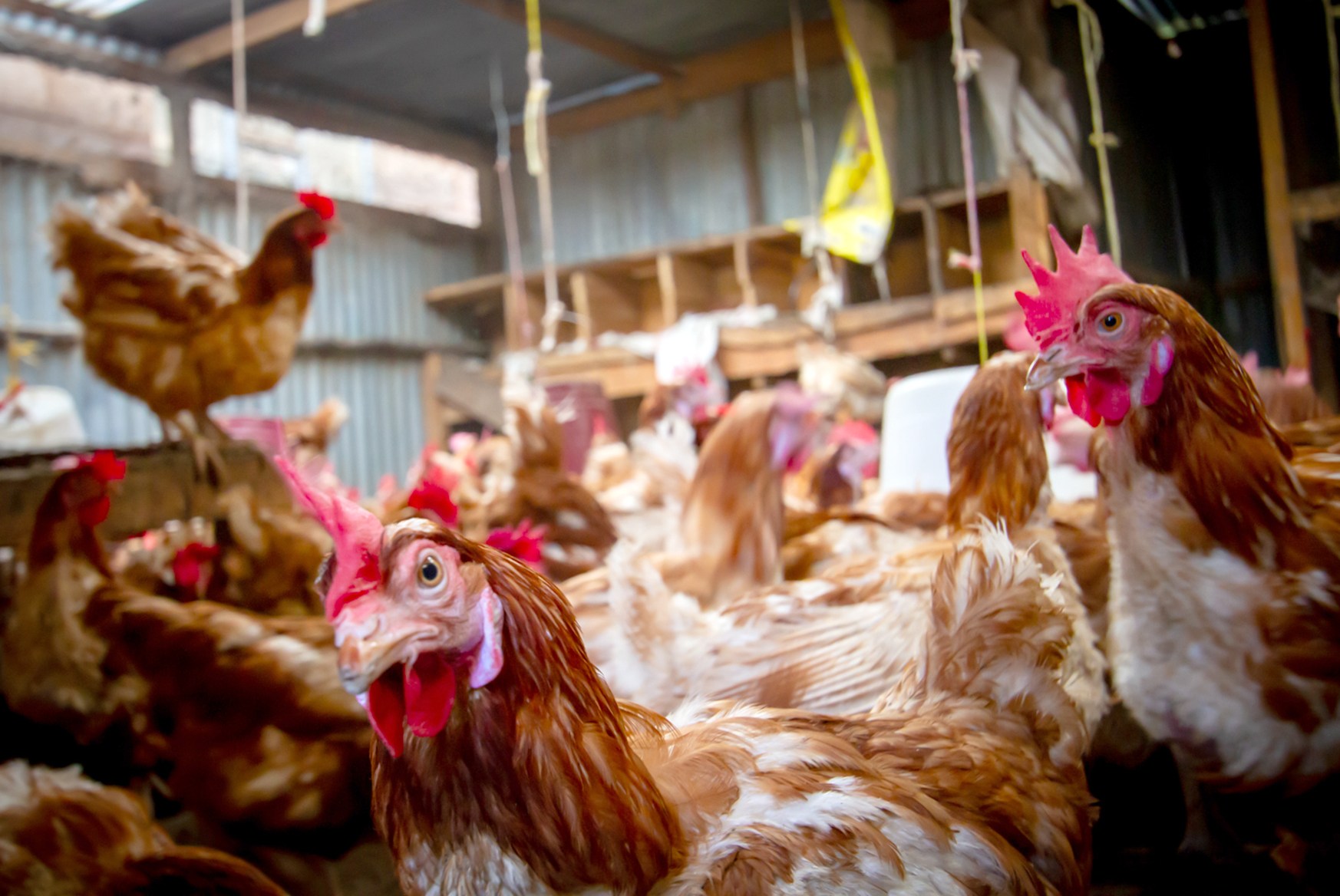
One of the biggest unanswered questions about cash transfers is whether they will incentivize more migration or encourage people to stay where they are.
Mathewos Shifa, 48, was forced to leave Ethiopia in December 2013 after government security officers kidnapped, tortured, and beat him unconscious; they falsely accused him of helping organize a protest for EthiopiaŌĆÖs marginalized Oromo ethnic group, to which he belongs. After he awoke the next day in a hospital, he fled across the border to KenyaŌĆÖs┬ĀKakuma Refugee camp.┬Ā
Unable to find work in the camp, he moved in 2017 to Nairobi, where he worked as a barber and split the 300 shillings (about $1.50 at the time) he earned from each haircut with the shopŌĆÖs owner. After GiveDirectly gave him a grant, he opened a barbershop of his own in the immigrant neighborhood of Eastleigh where he now earns twice as much. He used the extra income to buy a hairdryer and a small massage machine; he put some of it toward his savings to leave Kenya one day.┬Ā
ŌĆ£My dream is, God willing, to go to another country,ŌĆØ he says, in calm, perfect English with a deep, broadcaster-like voice. ŌĆ£We are unable to go back to Ethiopia, and we are unsafe here, too.ŌĆØ┬Ā
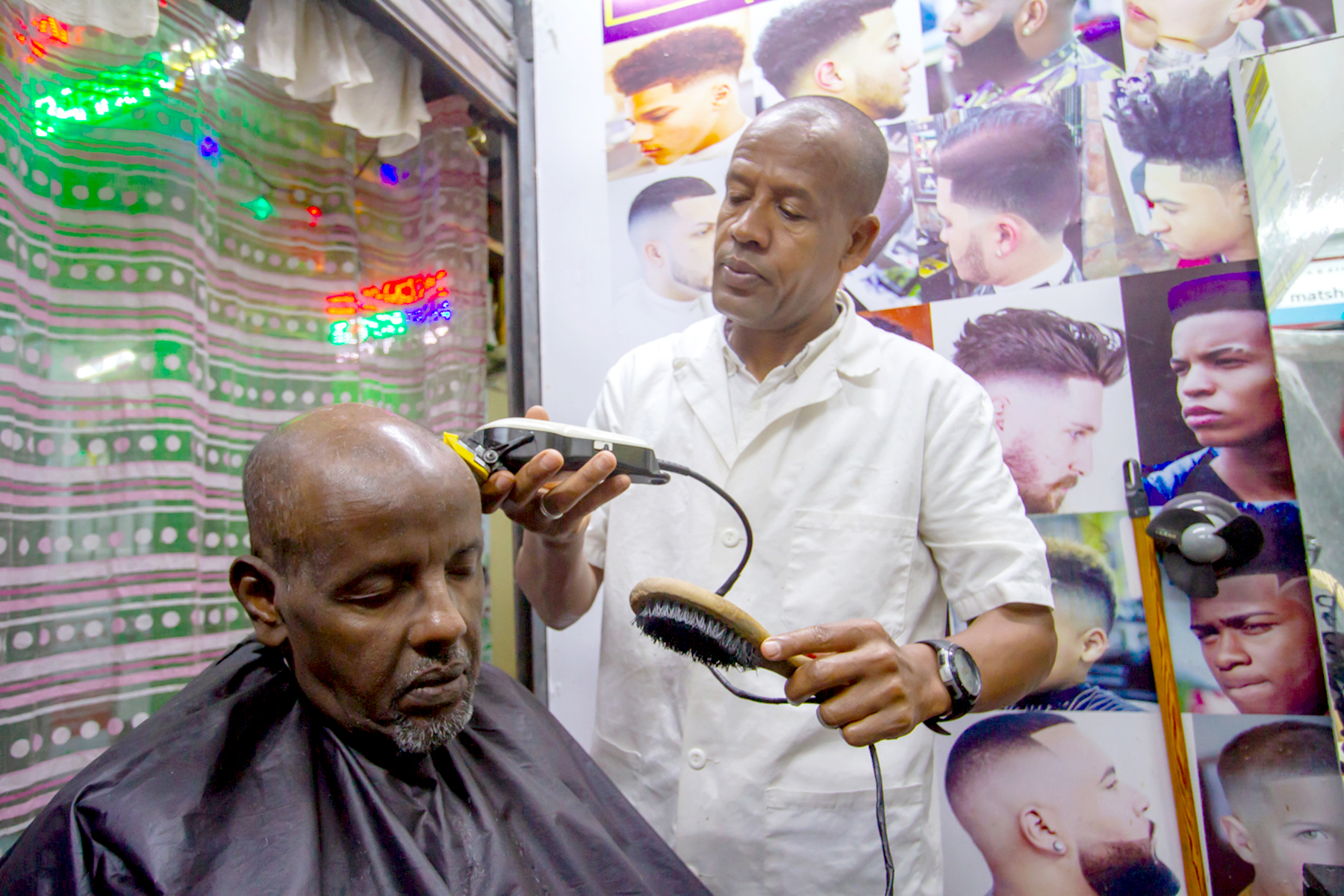
Some of his colleagues have been taken away here by Ethiopian government officers, Shifa said, who walk around the streets of Eastleigh gathering intelligence on potential dissidents and sometimes kidnapping them. ŌĆ£You never see them again.ŌĆØ
For people like Shifa, cash assistance might give refugees the money they need to migrate again, even if thatŌĆÖs not the intention. A 2020 study found that cash transfers on the Comoros islands off AfricaŌĆÖs southeastern coast increased migration to the nearby French island of Mayotte by 38 percent. Cash transfers could also entice even more refugees to move to the cities where that aid is available.┬Ā
Six months after receiving the cash, around 8.5 percent of recipients had left Nairobi, be it to move to other places in Kenya or abroad. (GiveDirectly plans to track how many recipients in the next phase of its study migrate in the long term). Although there were just under 1,200 recipients and the study followed them for only six months, the effects of the transfers in that initial period were stark: On average, refugeesŌĆÖ income increased by 81 percent, and their collective savings increased by 57 percent. They spent 30 percent of the money on existing businesses, and 15 percent on starting new ones. Nearly 900 of the nearly 1,200 refugees who received cash opened bank accounts.┬Ā
By the time GiveDirectly found Innocent, the carpenter from Rwanda, he was suffering from severe stomach pain. He used the money to undergo abdominal surgery and to buy a truckful of wood, which he carves into masks and then paints to sell to tourists as souvenirs.┬Ā
Skinny and wearing a red polo shirt and black jeans, he shows off some of his wares: small wooden mask key chains and elaborate elephants and human figurines. Two or three times a week he sells his wares at the Masai Market in Nairobi, where he earns 8,000 to 10,000 shillings ŌĆö more money in a day than what Kenyan police exhorted him for after kidnapping him. ŌĆ£Things changed so much!ŌĆØ
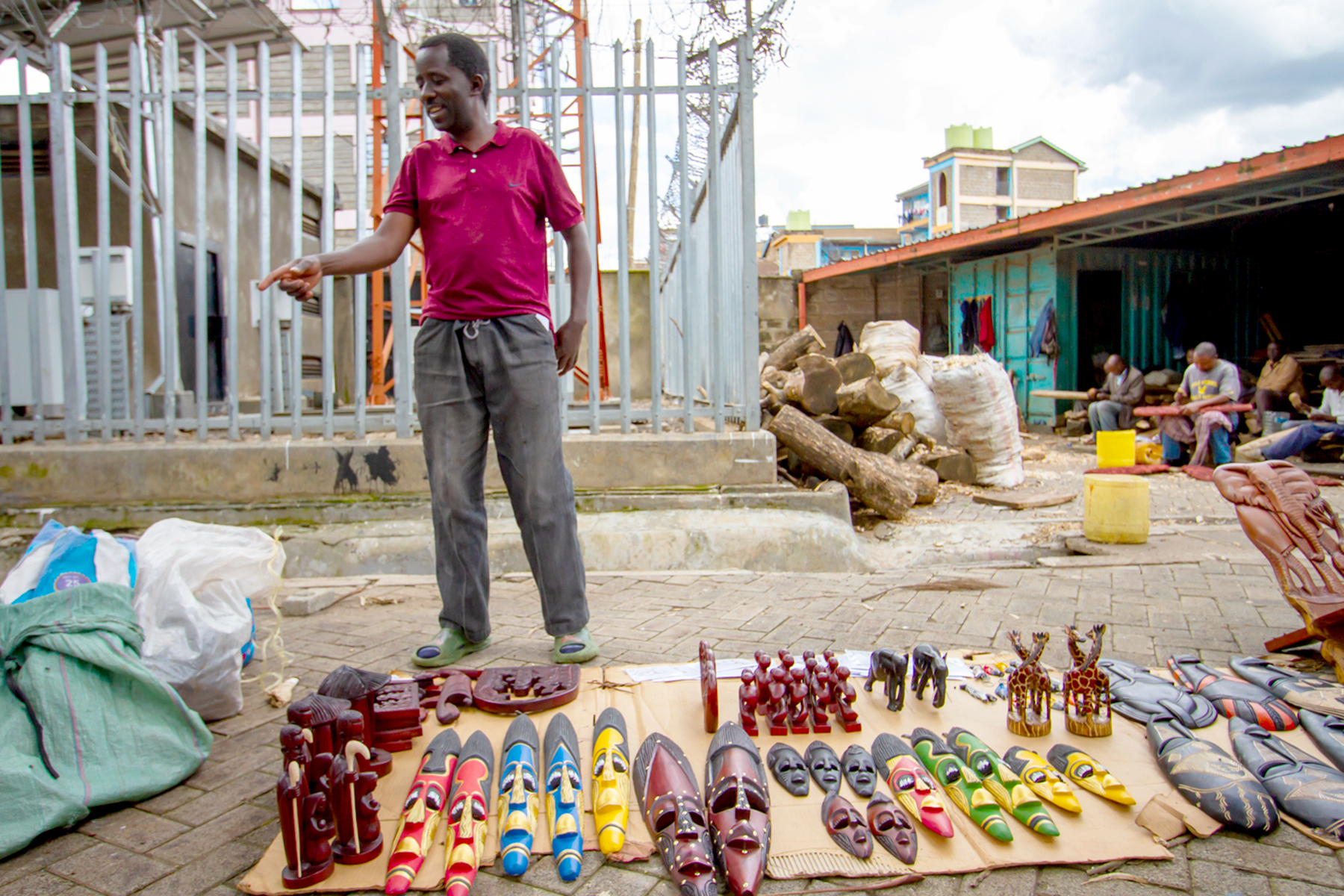
Still, tragedy befell some of the recipients. One refugeeŌĆÖs brother got sick and died, forcing her to spend some of the cash assistance on the medication. She used the remainder to pay rent, buy food, and start a fish stand.┬Ā
Another tried investing in crypto. One person moved from KenyaŌĆÖs northern region, where he ran a fish business, to Nairobi to open a rug and curtain store. A few bought motorbikes and became delivery drivers. Some women used the money to open beauty salons.
GiveDirectly is designing a new, larger study to see how cash can help refugees integrate into urban environments: 4,500 recipients will receive the equivalent of $725 each. The charity will closely monitor people not for six months, but for two years, to see if recipients actually escape poverty for good.┬Ā┬Ā
The new phase will also test whether adding job skills training or mentorship can amplify the effects of giving cash. One group of recipients will receive only cash, while another group will be offered a variety of training programs through Equity Bank. Give Directly will compare their earnings to a third group that wonŌĆÖt receive either form of assistance, until after the two-year trial is through.
ŌĆ£When refugees receive cash plus this equity bank intervention, what happens to them? What do they invest in?ŌĆØ Laker wondered. But the ultimate goal of this next phase, she said, is to understand, ŌĆ£Why do the ones who succeed, succeed? What barriers keep the other ones back?ŌĆØ┬Ā
These are urgent questions in a world with more refugees than ever before amid a concerning increase in conflict and a reduction in food rations to refugees. The UK, France, and other countries have reduced their foreign aid budgets in recent years, and if reelected, former President Donald Trump could again attempt to slash foreign aid as he did during his first term.┬Ā
ŌĆ£Everybody is cutting aid budgets right now, globally,ŌĆØ said Tyler G. Hall, of GiveDirectly. ŌĆ£The world is running out of funding for protracted refugee crises. A lot of these people arenŌĆÖt going home. So the way we spend our money should be focused on escape. ItŌĆÖs ŌĆśwhat can we do to integrate you, since these other actors canŌĆÖt give you 30 years of food?ŌĆÖŌĆØ
Due to the current scarcity of global aid, thereŌĆÖs an argument that helping only a small proportion of refugees is unfair to the rest.┬Ā
ŌĆ£Sometimes weŌĆÖre asked, why donŌĆÖt you just give smaller amounts of cash [to more people]?ŌĆØ Laker said. But ŌĆ£should they keep receiving aid as if theyŌĆÖre in crisis mode? What can lift them out of dependency?ŌĆØ
The results from a large lump sum study conducted in the Kiryandongo settlement in Uganda indicate that itŌĆÖs better to help people invest in sustainable wealth creation. The structural-economic idea behind universal cash transfers is that lower-income countries like Kenya have tons of workers but not enough work to do. By giving one-time transfers to those workers, they can create work opportunities for themselves, the thinking goes.┬Ā┬Ā
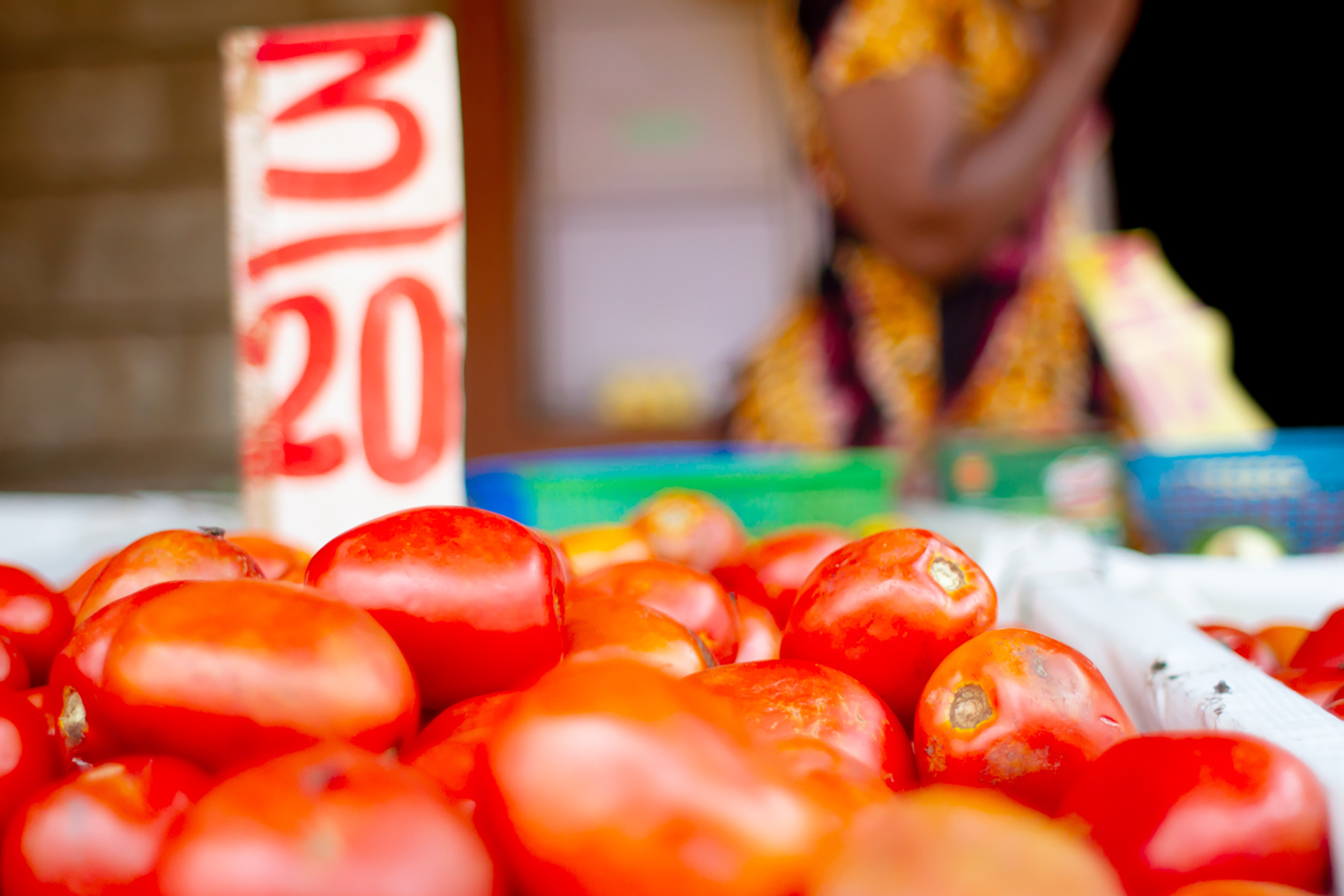
Photo courtesy of Jacob Kushner
Still, Hanna, the scholar and independent researcher on aid to the global poor, said GiveDirectly should pay close attention to how its recipients are selected, to ensure itŌĆÖs reaching those most in need ŌĆö rather than just those who have already been helped by other organizations, as they currently do. GiveDirectlyŌĆÖs initial urban refugee program identified recipients via international partner organizations such as HIAS, an American Jewish nonprofit that funds global programs to help refugees, and UNHCR, the United Nations refugee agency. The new, upcoming expanded program will incorporate recipients referred to them by local refugee-led organizations as well.┬Ā┬Ā
Ultimately, to end global poverty for urban refugees ŌĆö as well as everyone else ŌĆö will require not only innovative new programs like GiveDirectlyŌĆÖs, but also more funding and commitment from the wealthy nations and people of the world. It wouldnŌĆÖt take much: According to an analysis by the Brookings Institution, if all the worldŌĆÖs billionaires donated just 1 percent of their wealth to evidence-backed initiatives, it ŌĆ£would provide more than enough resources to end extreme poverty today.ŌĆØ